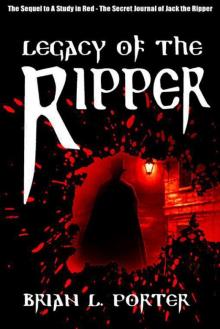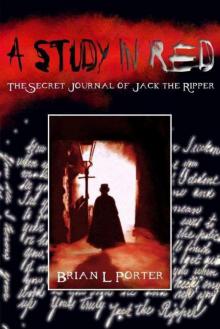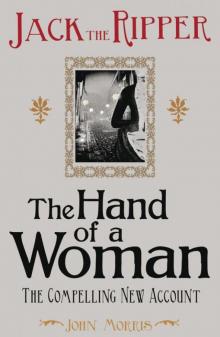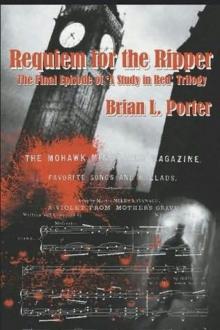A Study in Red - The Secret Journal of Jack the Ripper Read online
A Study in Red
Brian L. Porter
A Study in Red
Copyright © 2008 Brian L. Porter
All rights reserved under International and Pan-American Copyright Conventions. Published in Canada by Double Dragon eBooks, a division of Double Dragon Publishing Inc. of Markham Ontario, Canada.
No part of this book may be reproduced or transmitted in any form or by any means, graphic, electronic, or mechanical, including photocopying, recording, taping, or by any information storage or retrieval system, without the permission in writing from Double Dragon Publishing Inc.
This book is a work of fiction. Names, characters, places and incidents are products of the author's imagination or are used fictitiously. Any resemblance to actual events or locales or persons, living or dead, is entirely coincidental.
Double Dragon eBooks
PO Box 54016 1-5762 Highway 7 East
Markham, Ontario L3P 7Y4 Canada
http://double-dragon-ebooks.com
http://double-dragon-publishing.com
Cover art by Deron Douglas
www.derondouglas.com
ISBN-10: 1-55404-524-X
ISBN-13: 978-1-55404-524-2
First Edition January 3, 2008
Also Available as a Large Type Paperback
Now Available as paperback and hard cover
A Celebration of Cover Art: 2001 to 2006
Five Years of Cover Art
[Companion calendars also available]
www.double-dragon-ebooks.com
A STUDY IN RED
(The Secret Journal of Jack the Ripper)
By
Brian L Porter
ACKNOWLEDGEMENTS
In the course of writing 'A Study in Red' I was amazed at how many people became involved along the way. It is with them in mind that I take this brief opportunity to say thank you for without their help and co-operation the story would never have been completed.
Much of the source material used as reference notes by the character of Robert in the following pages was derived from my own references to the most comprehensive website on the Jack the Ripper case I could find. I thus convey my thanks to Stephen P Ryder for his generous permission to use the www.casebook.org name in the text of the novel, and as a source of reference. Equally, thanks are due to Edward McMillan of the Police Information Centre of Lothian and Borders Police for his invaluable help in tracing the history of the now defunct City of Edinburgh Police force. His knowledge of the subject was invaluable in putting together an important section of the story.
I would never have reached the final page of the book without the inestimable patience and hard work of my own team of volunteer proof readers, who took it upon themselves to read, critique, and suggest changes to word or plot where they felt it necessary. So again, a big thank you to Graeme S Houston, editor of Capture Weekly Literary Journal, and to Malcolm Davies, Ken Copley and Sheila Noakes, your help was invaluable. The final reader of the raw proof of the book was my dear wife Juliet who has spent many lonely hours as I sat at work on the novel, then reading and correcting my errors, and has kept me going on the many occasions when I thought I'd never complete the work.
I owe a big vote of thanks to my editor Lea Shizas. Her support when it looked as though the book would never see the light of day has been invaluable and a source of inspiration.
Finally I extend my thanks to two superb authors whose work has helped to influence my own humble offering. Tess Gerritsen and Jeffery Deaver, despite being unable to read the book in advance have both been kind enough to send me their best wishes for its success. I thank them for their generosity.
INTRODUCTION
The London of the 1880s differed greatly from the city of today. Poverty and wealth existed side by side, the defining line between the two often marked only by the turning of a corner, from the well-lit suburban streets of the middle-classes and the wealthy, to the seedy, crime and rat infested slums, where poverty, homelessness, desperation and deprivation walked hand in hand with drunkenness, immorality, and crime most foul. In the teeming slums of the city by night the most commonly heard cry in the darkness was thought to be that of 'Murder!' So inured were the people who lived amongst such squalor and amidst the fever of criminal intimidation that it is said, in time, no-one took any notice of such cries.
It was into this swirling maelstrom of vice and human degradation, London's East End, that there appeared a malevolent force, a merciless killer who stalked the mean streets by night in search of his prey and gave the great metropolis that was London its first taste of the now increasingly common phenomenon, the serial killer! The streets of Whitechapel were to become the stalking ground of that mysterious and as yet still unidentified slayer known to history as 'Jack the Ripper!'
AN EXTRACT FROM THE JOURNAL
Blood, beautiful, thick, rich, red, venous blood.
Its' colour fills my eyes, its' scent assaults my nostrils,
Its' taste hangs sweetly on my lips.
Last night once more the voices called to me,
And I did venture forth, their bidding, their unholy quest to undertake.
Through mean, gas lit, fog shrouded streets, I wandered in the night, selected, struck, with flashing blade,
And oh, how the blood did run, pouring out upon the street, soaking through the cobbled cracks, spurting, like a fountain of pure red.
Viscera leaking from ripped red gut, my clothes assumed the smell of freshly butchered meat. The squalid, dark, street shadows beckoned, and under leaning darkened eaves, like a wraith I disappeared once more into the cheerless night,
The bloodlust of the voices again fulfilled, for a while...
They will call again, and I once more will prowl the streets upon the night,
The blood will flow like a river once again.
Beware all those who would stand against the call,
I shall not be stopped or taken, no, not I.
Sleep fair city, while you can, while the voices within are still,
I am resting, but my time shall come again. I shall rise in a glorious bloodfest,
I shall taste again the fear as the blade slices sharply through yielding flesh,
when the voices raise the clarion call, and my time shall come again.
So I say again, good citizens, sleep, for there will be a next time...
~
To my dearest nephew, Jack,
This testament, the journal, and all the papers that accompany it are yours upon my death, as they became mine upon my father's death. Aunt Sarah, and I were never fortunate enough to have children of our own, so it is with a heavy heart that I write this note to accompany these pages. Had I any alternative, I would spare you the curse of our family's deepest secret, or perhaps I should say, secrets! Having read what you are about to read, I had neither the courage to destroy it, nor to reveal the secrets contained within these pages. I beg you, as my father begged me, to read the journal and the notes that go with it, and be guided by your conscience and your intelligence in deciding what course of action to take when you have done so. Whatever you decide to do, dear nephew, I beg you, do not judge those who have gone before you too harshly, for the curse of the journal you are about to read is as real as these words I now write to you.
Be safe, Jack, but be warned.
Your loving uncle,
Robert
Chapter One
A Revelation
My great grandfather was a physician, with a penchant for psychiatry, as were my grandfather and my father and it was always a given thing that I would follow in the family traditio
n, as, from childhood, I wanted nothing more than to follow in my forebears footsteps, to alleviate the suffering of the afflicted, to help ease the mental pain experienced by those poor unfortunates so often castigated and so badly misunderstood by our society. My name? Well, for now let's just call me Robert.
My father, whom I admit to idolizing for as long as I could remember, died just over four months ago, a sad waste, his life snuffed out in the few seconds it took for a drunk driver to career across the central reservation of the dual-carriageway he was driving along, and to collide head-on with Dad's BMW. By the time the ambulance reached the scene of the crash, it was too late, there were no survivors!
Dad was buried in our local churchyard, beside my mother, who passed way ten years ago, and the private psychiatric practice I had shared with him for so long became my sole domain. As a mark of respect, I took the decision to leave Dad's name on the brass plaque that adorns the pillar beside the front door. I saw no reason to remove it. A week after the funeral, I was surprised to receive a phone call from Dad's solicitor, saying he was in possession of a collection of papers my father had bequeathed to me. This was strange, as I thought the will had been straight forward, everything shared equally between my brother Mark and myself. I had received Dad's share of the practice, Mark a substantial and equivalent cash sum. As I drove to the solicitor's office I wondered what could be of such importance that Dad had left it to me in such a mysterious fashion.
As I drove away from the solicitor's office, I stared at the tightly bound sheaf of papers, wrapped in brown paper, and tied up with substantial string, that now resided on the passenger seat of the car. All that David the solicitor could tell me was that Dad had lodged the papers with him many years earlier, together with instructions they were to be passed to me alone, one week after his funeral. He told me Dad had placed a letter in a sealed envelope that would be on top of the package when I opened it. He knew nothing more. Knowing there was little I could do until I got home, I tried to put the package out of my mind, but my eyes kept straying towards the mysterious bundle, as if drawn inexorably by some unseen power. I was in a ferment of expectation as I drew up on the gravel drive of my neat detached suburban home, I felt as if Dad had something important to relate to me, from beyond the grave, something he obviously hadn't been able to share with me during his lifetime.
My wife Sarah was away for the week, staying with her sister Jennifer, who had given birth to a son four days after Dad's funeral. Jennifer had been married for three years to my cousin Tom, a brilliant if somewhat erratically minded computer engineer, who she had met at a dinner party at our house. Sarah had been reluctant to leave me so soon after Dad's passing, and the funeral, but I insisted she go and be with Jennifer at such an important and emotional time. I'd assured her I'd be fine, and, as I locked the car and made my way to the front door of our home, I actually felt relieved that I was alone. Somehow, I felt the papers I now carried under my arm were reserved for my eyes only, and I was grateful to have the time to explore their contents in private. I still had the rest of the week off, having paid a locum to baby-sit the practice during my official period of mourning, so the next few days were mine to do with as I chose.
Little did I know that, as I closed the heavy front door behind me, I was about to enter a world far removed from my cosy suburban existence, a world I had barely perceived from my history lessons at school. I was about to be shocked, all my conceptions of truth and respectability were to be rocked to the very core, though I didn't know it yet.
I quickly changed into casual clothes, poured myself a large scotch, and retired to my study, eager to begin my investigation into Dad's strange bequest. After seating myself comfortably in front of my desk, I took a sip of the warming, golden liquid in my glass, then, taking a pair of scissors from the desk, I tentatively cut the string around the bundle of papers. Sure enough, as the solicitor had indicated, there on top of a very thick loosely bound stack of papers was a sealed brown envelope, addressed to me, in the unmistakable handwriting of my father. My hands were unconsciously trembling with a sense of anticipation and curiosity as I reached out for the solid silver sword-shaped paper-knife Sarah had bought me for my last birthday. In one swift movement I slit the top of the envelope, reached inside and removed the letter within. The letter, handwritten by my father and dated almost twenty years earlier was a revelation to me, even though I was still unaware of the true significance of the loosely bound papers that accompanied it. The letter read as follows:
To my dearest son, Robert,
As my eldest son, and also my most trusted friend, I leave to you the enclosed journal, with its accompanying notes. This journal has been passed from generation to generation of our family, always to the eldest son, and now, as I must so obviously be dead, it has passed to you.
Be very careful, my son, with the knowledge this journal contains. Within its pages you will find the solution (at least, a solution of sorts) to one of the great mysteries in the annals of British crime, but with that solution comes a dire responsibility. You may be tempted, my son, to make public that which you are about to discover; you may feel the public deserves to know the solution to the burning mystery, but, and I caution you most carefully, Robert, should you go public with the knowledge, you will risk destroying not only everything that our family has stood for through over a hundred years of medical research and progression in the field of psychiatric medicine, but you may also destroy the very credibility of our most cherished profession.
Murder most foul Robert! It is of that most heinous crime that you will read, as I read following the death of your grandfather, and he also before me. But are there worse things than murder in this world? Do we have the right as doctors to make the judgments that the courts should rightly dole out? My son, I hope you are ready for what you are about to learn, though I doubt I was at the time I read the journal. Read it well my son, and the notes that go with it, and judge for yourself. If, as I did, you feel suitably disposed, you will do also as our family have always done, and keep the knowledge of its contents a closely guarded secret, until the time is right to pass it on to your own offspring. The knowledge is, I fear, the cross the family must bear, until one day perhaps one of us feels so ridden by conscience or some form of need for absolution, to reveal what the pages contain.
Be strong my son, or, if you feel you cannot turn the first page, go no further, reseal the journal in its wrappings, and consign it to a deep vault somewhere, let it lie forever in darkness, where perhaps it should rightly belong. But, if you do read the contents, be prepared to carry the knowledge with you for ever, in your heart, in your soul, but worst of all, in your mind, a burden of guilt that can never be erased.
You are my eldest son, and I have always loved you dearly. Forgive me for placing this burden upon you,
Yours with love,
Dad
As I finished reading the letter, I suddenly realized that I'd been holding my breath, such was the tension I felt inside, and I took a deep breath and sighed. The trembling in my hands had increased, and I reached for the bottle of amber liquid at the side of the desk, and poured myself another large one. Suddenly, I felt as if whatever was contained within these papers lying unopened before me was about to irrevocably change my life, not outwardly perhaps, but I knew before I even looked at the documents that whatever was contained within these pages was obviously of grave significance. If not, why had my family gone to such pains to protect the secret contained within them? I gulped the scotch down, too fast, the liquid burned my throat, and I coughed involuntarily.
At this point of course, I had no idea what the papers contained, though my father's words had given me a sneaking suspicion that I knew where this was leading. Unable to wait any longer, I broke the tapes around the journal, and there it was, the family secret, about to be unveiled! The first sheet of paper, resting on top of the rest, was definitely old, and written in the typical copperplate handwriting of the nineteenth centur
y. There was no date or address at the top of the paper, it seemed to be little more than a series of notes, there was no signature, nothing at all to identify the writer.
I read as follows: How do I begin to relate all that has happened? Would anyone believe the incredible story? Is it the truth? Is he really the man? The journal could be the work of a clever man, an attempt to deceive those who read it, but no, I knew him too well, spoke with him too often. He was telling the truth! As for me, what of my part in all this? Am I guilty of complicity, or have I done the world a favour by my actions? That he will trouble the people of London no more is now certain. That he was deranged I could testify to myself, but what of proof? What of evidence? Apart from the ravings of the lunatic, all I have is the journal, and I had it too long, knew too much too soon, to bear the disgrace of admitting that I could have stopped it all if I had spoken sooner. Now I cannot speak at all for to do so would destroy me, my work, and my family. Who would understand that I held silent because I thought him mad, too mad to believe, and yet his madness was the very thing that drove him, and I should have believed? It was too late, I could do no more, God help me, I should have stopped him, stopped him right at the beginning when he told me, when he laughed and laughed and told me that no-one would ever catch him.
After the most hideous death of that poor girl, Mary Kelly, I had to do something, and I did, but, knowing what I know, what I knew already, I should have acted sooner. May God forgive me; I could have stopped Jack the Ripper!
I was holding my breath again, and, as I exhaled, my eyes moved to the final note at the bottom of the page, seemingly written some time later than the rest of the notes, the writer's hand less bold, as though he were shaking as he wrote these final words.

 Legacy of the Ripper
Legacy of the Ripper A Study in Red - The Secret Journal of Jack the Ripper
A Study in Red - The Secret Journal of Jack the Ripper Jack the Ripper: The Hand of a Woman
Jack the Ripper: The Hand of a Woman Requiem for the Ripper
Requiem for the Ripper